

Howard Rheingold: The new power of collaboration. Productivity Strategies. Collaboration: A Primer. Prepared for the ACS Strategic Planning Committee by Amanda Hagood, Director of Blended Learning, Associated Colleges of the South, and Grace Pang, Program Officer, National Institute for Technology in Liberal Education Introduction This primer was developed from a study of sixteen case studies in digitally-mediated collaboration and the liberal arts published by the Associated Colleges of the South (ACS) and the National Institute for Technology in Liberal Education (NITLE) in the summer of 2014.
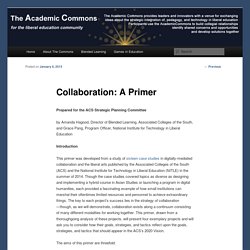
Though the case studies covered topics as diverse as designing and implementing a hybrid course in Asian Studies or launching a program in digital humanities, each provided a fascinating example of how small institutions can marshal their oftentimes limited resources and personnel to achieve extraordinary things. The aims of this primer are threefold: Key Question: Does our strategic plan reflect and enact the values of accessibility, affordability, and accountability? Defining Strategies. Open Collaboration Map. Llaborative working — Penny Walker’s blog. Tempting and disconcerting in equal measure: being asked to write a book is such a flattering thing, dangerously seductive; being asked to write a book is such a frightening thing, because “what if it’s rubbish?”
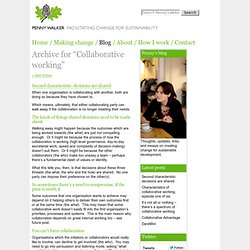
Putting something in writing is a moment of commitment: hard for an inveterate hedger and fence-sitter like me. (I couldn’t even decide between ‘hedger’ and ‘fence-sitter’, could I?) Avoiding temptation, taking courage. Rachel Botsman. Cluster. A movie by Design - Community. Participatory Publishing. Best Online Collaboration Tools 2012 - Robin Good...
Start Brainstorming! Take Social Collaboration To Next Level - Global Cio - Executive. Social collaboration for teams is important, but here's how to scale up using "creation spaces" of forums, videos and other networked tools.
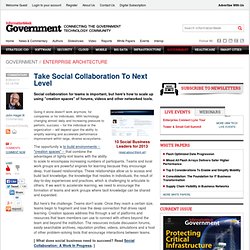
Going it alone doesn't work anymore, for companies or for individuals. With technology changing almost daily and increasing pressure to perform, success -- for the individual or the organization -- will depend upon the ability to amplify learning and accelerate performance improvement within large, diverse ecosystems. The opportunity is to build environments -- "creation spaces" -- that combine the advantages of tightly-knit teams with the ability to scale to encompass increasing numbers of participants.
Teams and local work groups are powerful engines for learning because they encourage deep, trust-based relationships. These relationships allow us to access and build tacit knowledge, the knowledge that resides in individuals, the result of day-to-day experiences and practices, which is challenging to articulate to others. Finding the transcendent interest. Howard Rheingold: Knowing How to Collaborate Is Essential. I just read the Kindle edition of “Net Smart,” written by writer and critic Howard Rheingold.
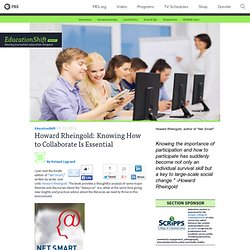
The book provides a thoughtful analysis of some major theories and discourses about the “always on” era, while at the same time giving new insights and practical advice about the literacies we need to thrive in this environment. I’ve followed Rheingold’s posts and videos for some time now, attended presentations, and participated in some of his courses. He’s not only an expert in virtual communities (a term he coined himself) and social media, but also teaches digital journalism. I had the opportunity to interview him recently about the implications of his thinking on media, journalism and journalism education.
MediaShift: Howard, how Internet-savvy are digital natives — do they need experts such as you to find their way? I had believed the mythology of digital natives and also assumed that most of today’s college students are like my daughter and all her friends. Peeragogy Related. Be a Better Global Collaborator - Amy Gallo - Best Practices. In today’s globalized world, it is essential to know how to collaborate with people from different cultures.
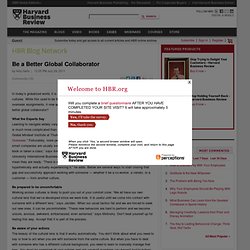
While this used to be the case primarily for country managers and those taking on overseas assignments, it now applies to all managers. But exactly how does one learn to become a better global collaborator? What the Experts Say Learning to navigate widely varying business practices is far from straightforward. “Global leadership is much more complicated than leading people like you,” says Mansour Javidan, the Director of the Global Mindset Institute at Thunderbird School of Global Management and author of “Making It Overseas.” Fortunately, more people are doing their due diligence these days. Be prepared to be uncomfortable Working across cultures is likely to push you out of your comfort zone. Be aware of your actions The beauty of the cultural lens is that it works automatically.
Molinsky suggests you expose yourself to the kinds of challenges you’ll experience in advance. COLLABORATION. HyLighter. Solve For X. Sharedearth.net - trust. share. connect. World Economic Forum-Talent Mobility Good Practices - Collaboration at the Core of Driving Economic Growth. Talent Mobility Good Practices – Collaboration at the Core of Driving Economic Growth, prepared in collaboration with Mercer, is based on 55 case studies from around the world.
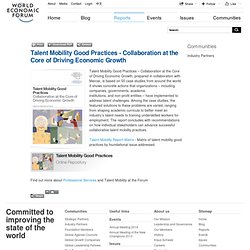
It shows concrete actions that organizations – including companies, governments, academic institutions, and non-profit entities – have implemented to address talent challenges. Among the case studies, the featured solutions to these problems are varied, ranging from shaping academic curricula to better meet an industry’s talent needs to training underskilled workers for employment. The report concludes with recommendations on how individual stakeholders can advance successful collaborative talent mobility practices.
Collaborative Enterprise Innovation. Www.finnova.ch/_uploads/referat/finnova_referat_98_de.pdf.